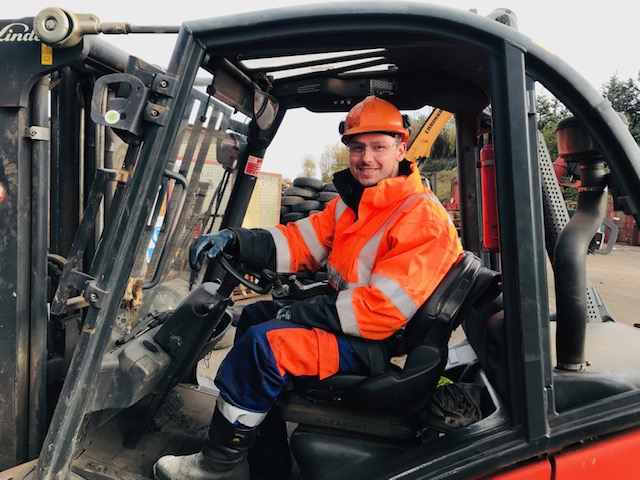CHOOSE
A DIFFERENT TERRITORY

EMR's Head of Learning & Development, Chris Williams, on the trailblazing apprenticeship scheme that's setting the industry - and its newcomers - apart
EMR has been working hard to elevate the perceptions of recycling and waste management. Metal recycling relies on a great deal of business and scientific knowledge crossing chemistry, economics, environmental management, health and safety and compliance. EMR’s ultimate goal is to get related fields recognised as STEM subjects in their own right, owing to the complexity of the processes involved.
As youth unemployment surges in the wake of the COVID-19 pandemic, it’s more important than ever to re-evaluate the opportunities for future generations entering the job market.
Even before the public health crisis, the metal recycling industry was helping to dually tackle the youth unemployment issue, alongside the sector’s notable skills shortages.
That’s why, over two years ago, EMR headlined an initiative involving 16 peer companies - many of whom were competitors - to form a first-of-its-kind apprenticeship scheme. The mission was to invest in learning and skills development to drive business growth that helps shape a more sustainable future, for us all.
The resulting Metal Recycling General Operative (MRGO) Level 2 apprenticeship was first developed and has since gone from strength to strength. A major milestone was reached in 2019, when it was recognised at the National Recycling Awards, winning the award for ‘Excellence in Learning and Development’.
Metal recycling can now show that, as an sector, there is not only an attractive, but clear career path, for those wanting to join - and even enhance - what has long been a widely misunderstood and undervalued sector. And the beauty of the carefully devised course content is that the programme is highly pragmatic; exposing candidates to the daily challenges faced both outside, on the yard, and in office environments.
Upon completion of an introductory core element, apprentices have the opportunity to specialise in one of five specialist technical areas: End-of-Life Vehicles (ELV), Weighbridge, Material Handler (Specialist Equipment), Material Classification and Waste Electrical and Electronic Equipment (WEEE). Meaning the scheme is just as relevant for people that may already be working in the industry and want to upskill.
David Geary, who worked as a Plant Operative in the Fridge Recycling facility at EMR Darlaston for five years prior to starting his MRGO Apprenticeship, believes that the qualifications have given him a great opportunity to develop the knowledge he already had about the metal recycling industry, as well as allowing him to explore the many different roles available on the yard. Choosing to specialise in end-of-life vehicles, he credits the apprenticeship with helping him to develop an understanding of why it is important to manage the lifecycle of a vehicle, in an environmentally conscious way.
Like other apprentices choosing this specialist technical area, David was taught the process of recycling a wide range of vehicles from start to finish, encompassing training in risk mitigation, pollution avoidance and overall efficiency.
Apprentices undertaking one of the four other technical areas have to address similar complex scenarios:
Through cross-industry collaboration, the collective involved in setting up the MRGO continues their quest to elevate the industry. Inspiring an ambitious and responsible workforce to stop thinking ‘scrap’ and start thinking STEM (Science, Technology, Engineering, and Mathematics), in pursuit of progression and a more rewarding metal recycling career.
Before completing the MRGO Apprenticeship programme, EMR’s Louis Frost had been working within the business for six years - four of which were based at the company’s ELV processing site in Salford. He is now working on an ELV project which sees him travelling to sites up and down the country.
“Before completing the MRGO I had worked in many roles on the yard, from a General Yard Operative working with non-ferrous metals to an ELV Plant Operative processing vehicles. It is my ambition to become an Operations Manager, so I decided to complete the apprenticeship to get a better understanding of the sector as a whole.
“The MRGO really helped me to develop my knowledge around the legislation that surrounds day-to-day operations.”
If you are interested in a career with EMR find our current roles here or you can find out more about the MRGO apprenticeship here.